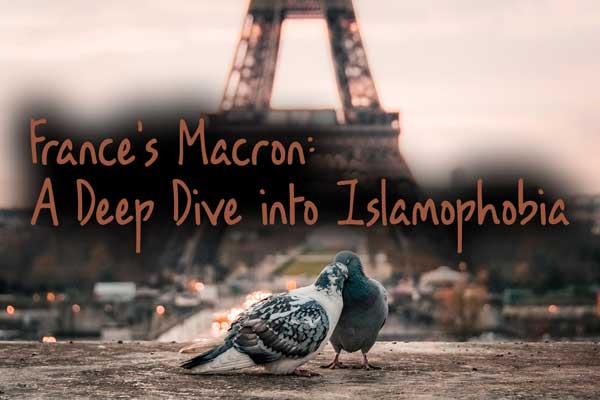When President Emanuel Macron of France declared in the aftermath of the beheading of French high school teacher Samuel Paty by 18-year-old Abdoullah Anzorov that “Islam is in crisis everywhere,” he inadvertently unleashed controlled furor across the Muslim world. Rather than calming things down after the gruesome murder, Macron vilified 1.7 billion Muslims and the religion of Islam by his indiscriminate remarks. By displaying to his classes cartoons published by the French satirical magazine, Charlie Hebdo, Paty reignited a controversy that had erupted in France in 2015.The cartoons insulted the dignity of the globally-revered man, Prophet Muhammad ibn Abdullah (peace be upon him). In the aftermath of Paty’s murder and the stabbing death of three parishioners in a cathedral in Nice, the viability of Muslims living in French society has once again dominated national discourse. Yet, the contemporary relationship of Muslims to French society cannot be understood or defined by any series of singular events, or by the pronouncements or actions of various French presidents and their administrations. To understand the present and project possible future developments for Muslims in France, history is prologue; that is, history helps to set the context for the present.
Historical Context
France, with its considerable military might, occupied the predominately Muslim north African country of Algeria in 1830. To facilitate its near total domination of the Muslim country, one million French, Spanish, and Italian nationals (colons) settled in Algeria, thereby constituting 10 percent of the nation’s total population. These colonial settlers imposed a tiered citizenship structure in the country much akin to the social dynamics of white privilege and control established later in apartheid South Africa in 1948. The social and economic stratification of Algerian society was enforced by the French military, much to the chagrin and resentment of the Algerian people. An irreversible turning point in Franco-Algerian relations began on the day that Nazi Germany surrendered in World War II, on May 8, 1945. Approximately 5,000 Muslims celebrated Germany’s defeat, many of whom carried Algerian flags and banners decrying French colonial rule in the country. When French soldiers attempted to forcibly take the flags and banners, shots were fired and both Muslim celebrants and French soldiers were shot. As tensions escalated, 102 Europeans were killed by irate Algerians in the countryside. French military officials were commanded by Paris to take retribution for the slain Europeans. Estimates of up to 30,000 Algerians, almost all of whom were civilians, were slaughtered by the French military in retaliation. Almost ten years later, the Algerian War of Liberation was fought against France, starting in 1954, culminating in Algeria’s independence from France in 1962 after brutal attempts by the French military to suppress the revolution. The Algerian war efforts were led by the Algerian National Liberation Front.
In 1881, fifty years after France colonized Algeria, the Muslim majority nation of Tunisia was similarly colonized. Both Algeria and Tunisia had been a part of the Ottoman empire for three centuries until after the Russo-Turkish War in 1877 when Russia defeated the Ottoman Turks. The colonial adventures of France in West Africa are reputed to have started as early as 1659 with the establishment of the trading post, Saint Louis, in Senegal, and the capture of Goree Island from the Dutch in 1677. Cheikh Anta Diop, a brilliant renowned Senegalese Muslim anthropologist, historian, physicist, author, and politician, wrote in his 1991 book, “Civilization or Barbarism: An Authentic Anthropology,” a searing analysis of European and French colonialism in Africa. He wrote, “Thus imperialism, like the prehistoric hunter, first killed the being spiritually and culturally before trying to eliminate it physically. The negation of the history and intellectual accomplishments of Black Africans was cultural and mental murder, which preceded and paved the way for their genocide here and there in the world.”
Legacies of Colonialism
France, along with other European nations, continue to struggle with their legacies of colonialism and how it impacts its present worldview and human and geopolitical relations. The colonial holdings of France peaked in 1929 when it was one of the largest empires of the 20th century. At that time, 72 nations were a part of the French empire, covering 8.7 percent of the land mass of the earth. Over the last 100 years, France has developed a unique colonial relationship with its non-European citizens and territories. Its spheres of influence are divided into 18 regions, states, and provinces and five Departments and Overseas Territories. Five of the Overseas Territories are island nations: Guadelope (Caribbean), Martinique (Caribbean), French Guam (South America), Mayott (Indian Ocean), and Reunion (Indian Ocean). All these territories and their citizens are considered a part of France, a single country scattered around the world. All non-Europeans residing in these areas can vote in French elections and are, theoretically at least, afforded all the rights and privileges of French citizens residing in the country of France.
Currently, there are approximately four million Muslims residing in France, the largest Muslim population on the European continent which includes the greatest number of indigenous citizens converting to Islam. In a recent webinar entitled “France’s Islamophobia: Religious Separatism or Disciplining Muslims,” numerous French panelists emphasized the point that the acts of terror committed in Paris and Nice are being used as justifications to implement draconian measures against Muslims. Over 76 mosques have been closed, numerous Muslim schools and organizations have been forced to cease operations, and imams and other Muslim leaders are being arrested on conspiracy charges.Anti-Muslim rhetoric by right wing National Front politicians and others has increased, and physical assaults, including attacks against Muslim women and girls, are on the rise. One of the panelists, Hamza Esmili, made the point that French officials are openly lamenting the fact that Muslims have migrated to France on a daily basis from the Maghrib, West Africa, and the Middle East, and have subsequently entered into every aspect of society. The French landscape has been populated by over 2,300 mosques in a country whose core state principal is secularism (laicite). Esmili further stated that French politicians are decrying the fact that too many French Muslims have integrated into French society rather than assimilating (assimilating is adopting the ways of the dominant culture; integrating is maintaining one’s cultural differences while participating fully in the society).
Like most issues in the world, this one is more complicated than a simple, reductionist explanation would have it. France passed a law in 1905 that created a separation of church and state, with the explicit purpose of ensuring freedom of conscience and “the free exercise of religion.” France thus became a secular state and broke its ties to the Catholic religion. Some would argue that a secular state is a positive thing in that guarantees the free exercise of religion, at least in theory. Muslims in the U.S. certainly view the separation of church and state and the secular nature of this nation as benefiting them at this point in history.
Further complicating the matter with regard to France, is that there is an aversion to communalism, the identification and allegiance to one’s racial, ethnic, or religious group rather than to French society as a whole. That is what Hamza Esmili was referring to regarding French politicians’ lament that French Muslims had integrated rather than assimilated into French society. In the U.S., communalism is seen differently in that allegiance to American society, alongside attachment to one’s ethnic, cultural, or religious heritage, is not considered a negative. In fact, it is held aloft as America’s proud diversity. The melting pot tradition, in current times, has been somewhat transformed so that American society is described as a mosaic or a multi-colored tapestry; it is seen as a multi-cultural reality in which differences are honored at the same time that an overarching Americanism is in place. In France, communalism —allegiance to and public expression of one’s identity as a distinct racial, ethnic, or religious group within French society — is seen as a threat to assimilation and cultural cohesion. French secularism sees sameness, rather than differences, as essential to shared French values and a mainstay of the common good. Thus, French Muslims have a difficult course to navigate.
Difficult Choices
The future of Muslims in France is yet to be determined. At this historical juncture, Muslims in France are seemingly challenged to either assent to the citizenship demands of the state to place being French and secular above any other personal or group identity, or to develop Islamically sound community development options. As demonstrated by the 2005 civil disturbances involving young Muslims crammed into suburban slums around Paris with few opportunities for educational, social, or economic mobility, Muslims living in France are at a crossroads. On one hand, there is the realization that the conditions that necessitated their immigrating to France in the first place were to a large degree created by the colonial practices of France and other European nations.
The downturn in the global economy and international travel restrictions imposed due to Covid-19 militate against the prospects of individuals and families improving their financial condition by migrating to another country. For the immediate future, sheltering in place and altering lifestyle practices that cause unnecessary expenses and sacrifices seem to be more viable options at this time. Since the advent of the first Islamic movement in Makkah and Madina, Arabia under the leadership of Prophet Muhammad (peace be upon him), committed Muslims have best navigated societal challenges by utilizing the guidance of the Qur’an and authentic sunnah of Prophet Muhammad (peace be upon him).
The future of Muslims in France is yet to be determined. At this historical juncture, Muslims in France are seemingly challenged to either assent to the citizenship demands of the state to place being French and secular above any other personal or group identity, or to develop Islamically sound community development options. As demonstrated by the 2005 civil disturbances involving young Muslims crammed into suburban slums around Paris with few opportunities for educational, social, or economic mobility, Muslims living in France are at a crossroads. There is the realization that the conditions that necessitated their immigrating to France in the first place were to a large degree created by the colonial practices of France and other European nations.Since the advent, however, of the first Islamic movement in Makkah and Madina, under the leadership of Prophet Muhammad (peace be upon him), committed Muslims have best navigated societal challenges by utilizing the guidance of the Qur’an and authentic sunnah of Prophet Muhammad (peace be upon him).





